subjunctive mood
- 格式:ppt
- 大小:437.00 KB
- 文档页数:58
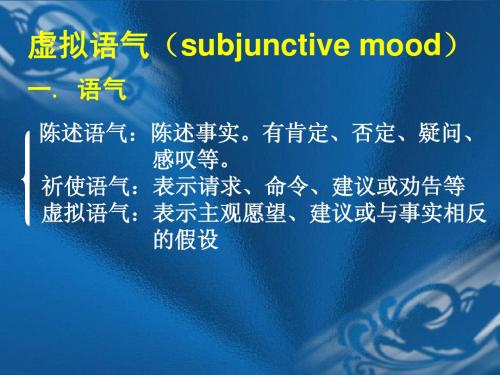
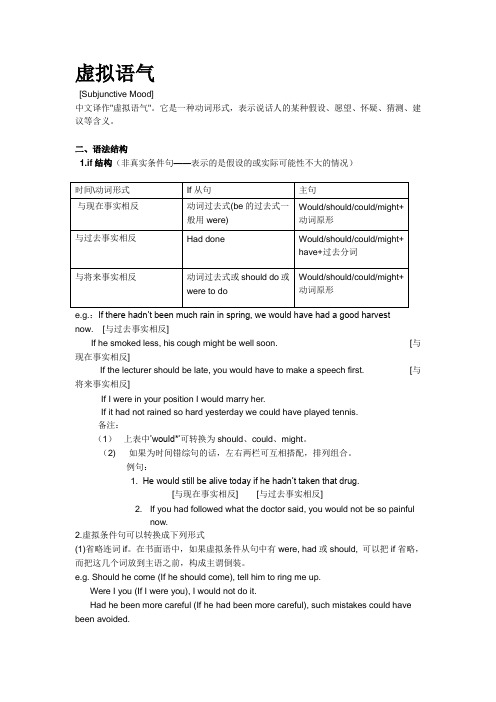
虚拟语气[Subjunctive Mood]中文译作"虚拟语气"。
它是一种动词形式,表示说话人的某种假设、愿望、怀疑、猜测、建议等含义。
二、语法结构1.if结构(非真实条件句——表示的是假设的或实际可能性不大的情况)e.g.:If there hadn’t been much rain in spring, we would have had a good harvestnow. [与过去事实相反]If he smoked less, his cough might be well soon. [与现在事实相反]If the lecturer should be late, you would have to make a speech first. [与将来事实相反]If I were in your position I would marry her.If it had not rained so hard yesterday we could have played tennis.备注:(1)上表中’would*’可转换为should、could、might。
(2) 如果为时间错综句的话,左右两栏可互相搭配,排列组合。
例句:1. He would still be alive today if he hadn’t taken that drug.[与现在事实相反] [与过去事实相反]2. If you had followed what the doctor said, you would not be so painfulnow.2.虚拟条件句可以转换成下列形式(1)省略连词if。
在书面语中,如果虚拟条件从句中有were, had或should, 可以把if省略,而把这几个词放到主语之前,构成主谓倒装。
e.g. Should he come (If he should come), tell him to ring me up.Were I you (If I were you), I would not do it.Had he been more careful (If he had been more careful), such mistakes could have been avoided.在虚拟条件句中,省略连词的倒装形式,其句首不能用助动词的缩略否定式。
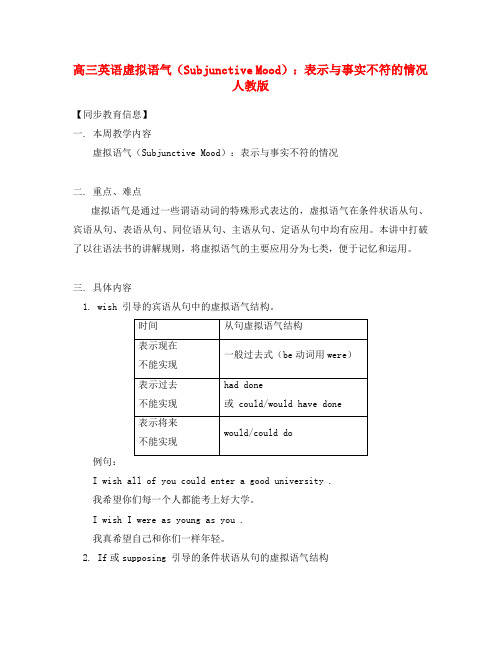
高三英语虚拟语气(Subjunctive Mood):表示与事实不符的情况人教版【同步教育信息】一. 本周教学内容虚拟语气(Subjunctive Mood):表示与事实不符的情况二. 重点、难点虚拟语气是通过一些谓语动词的特殊形式表达的,虚拟语气在条件状语从句、宾语从句、表语从句、同位语从句、主语从句、定语从句中均有应用。
本讲中打破了以往语法书的讲解规则,将虚拟语气的主要应用分为七类,便于记忆和运用。
三. 具体内容1. wish 引导的宾语从句中的虚拟语气结构。
例句:I wish all of you could enter a good university .我希望你们每一个人都能考上好大学。
I wish I were as young as you .我真希望自己和你们一样年轻。
2. If或supposing 引导的条件状语从句的虚拟语气结构注:(1)从句和主句可以根据时间选择不同的虚拟语气结构(2)从句中的虚拟语气结构可以使用倒装,去掉if,用were , had , should 代替if。
(3)其他由as if , as though , even if , even though , if only引导的状语从句或表语从句中,都使用由if引导的从句虚拟语气结构。
例句:If you had prepared for the exam well , you wouldn’t have failed .如果你好好复习,你就不会不及格了。
Supposing you had prepared for the exam well , you wouldn’t regret now .如果你好好复习了,现在就不会后悔。
Were I you , I wouldn’t waste the time .如果我是你,我就不浪费时间。
He looks as if he had known the secret.他看上去好像知道了那个秘密。
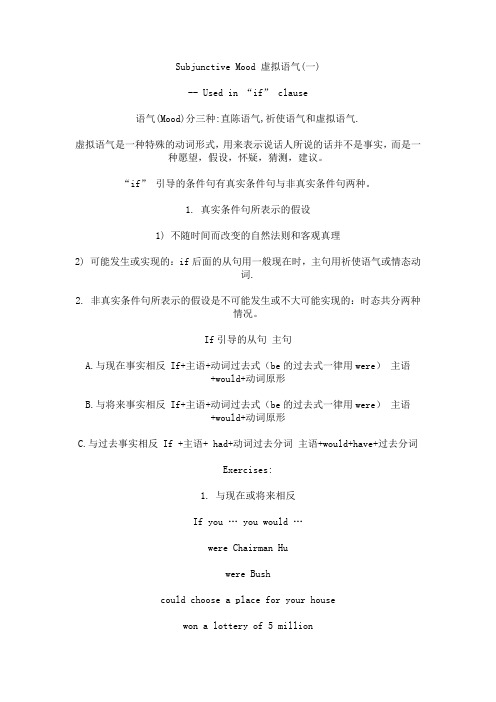
Subjunctive Mood 虚拟语气(一)-- Used in “if” clause语气(Mood)分三种:直陈语气,祈使语气和虚拟语气.虚拟语气是一种特殊的动词形式,用来表示说话人所说的话并不是事实,而是一种愿望,假设,怀疑,猜测,建议。
“if” 引导的条件句有真实条件句与非真实条件句两种。
1. 真实条件句所表示的假设1) 不随时间而改变的自然法则和客观真理2) 可能发生或实现的:if后面的从句用一般现在时,主句用祈使语气或情态动词.2. 非真实条件句所表示的假设是不可能发生或不大可能实现的:时态共分两种情况。
If引导的从句主句A.与现在事实相反 If+主语+动词过去式(be的过去式一律用were)主语+would+动词原形B.与将来事实相反 If+主语+动词过去式(be的过去式一律用were)主语+would+动词原形C.与过去事实相反 If +主语+ had+动词过去分词主语+would+have+过去分词Exercises:1. 与现在或将来相反If you … you would …were Chairman Huwere Bushcould choose a place for your housewon a lottery of 5 millionyour child were addicted to computer gamescame across a blackout in a lift2. 与过去相反Write conditionals based on the following facts.1) She didn’t take t he medicine, so she felt carsick.2) Because the sun was in the right direction, the photos came out verywell.3) The shop didn’t pack the goods properly, so they got damaged.4) The government raised taxes, so they were very unpopular.5) He wasn’t able to answer all the questions, so he didn’t pass theexamination.6) He didn’t pass the examination, so he didn’t go to the university.7) We didn’t get there on time, so we found the doors locked in our faces.8) She didn’t see Curse of the Golden Flower, so she didn’t understandwhat I said.3. Multiple choices1. What will we do if it _____ tomorrow?A. snowB. would snowC. snowsD. will snow2. You _____ such a serious mistake if you had followed his advice.A. may not makeB. might not makeC. wouldn’t have madeD. might have made3. _____ to see the doctor right away, he might have been alive.A. If he wentB. If he goneC. If he has goneD. If he had gone4. If you were older, I _____ you to go there yesterday.A. will allowB. should allowC. would have allowedD. had allowed5. If we _____ here ten minutes earlier, we _____ the bus.A. arrived/would catchB. arrived/would have caughtC. had arrived/had caughtD. had arrived/would have caught6. If I _____ more time, I would have gone with him.A. hadB. had hadC. have hadD. would have7. Don't touch the sleeping tiger. If he woke up, he _____ you.A. would comeB. would come atC. would have comeD. will come at8. If it _____ tomorrow, what would we do?A. rainsB. were to rainC. would rainD. rain9. If he _____ to the teacher attentively, he _____ the answer to theproblem.A. had listened, would have knownB. listened, would knowC. listened, would have knownD. had listened, would know10. ---- I thought you would come back tomorrow.---- I would if I _____ to attend a meeting.A. don’t haveB. didn’t haveC. will not haveD. would not have11. If I had hurried, I _____ the train.A. would catchB. could catchC. would have caughtD. had caught12. If I had known that, I _____ so.A. wouldn’t doB. wouldn’t have doneC. won’t doD. have not done13. If I _____ you, I wouldn’t call back.A. beB. amC. wasD. were14. If the doctor had been available, the child _____.A. would not dieB. would not have diedC. could not dieD. could die15. You are late. If you _____ a few minutes earlier, you _____ him.A. came/ would meetB. had come/ would have metC. come/ will meetD. had come/ would met16. If you had told me in advance, I _____ him at the airport.A. would meetB. would had meetC. would have metD. would have meet17. If it _____ another ten minutes, the game would have been cancelled.A. had rainedB. would had rainedC. have seenD. did see18. You _____ the train if you _____ a little earlier.A. could take/ startedB. would have taken/ had startedC. could take/ had startedD. would have took / started19. The Bakers arrived last night, if they’d only let us know earlier,_____ at the station.A. we’d meet themB. we’ll meet themC. we’d have met themD. we’ve met them20. If I _____ you, I _____ more attention to English idioms and phrases.A. was/ shall payB. am/ will payC. would be/ would payD. were/ would pay21. We might have failed if you _____ us a helping hand.A. have not givenB. would not giveC. had not givenD. did not give22. If I _____ the money, I would have bought a much bigger car.A. possessedB. ownedC. hadD. had had23. If her husband had not liked the dress _____.A.she would be delightedB. he would get madC. she would have returned itD. she would take it back to the store24. If I _____ you, I _____ worry.A. were/ wouldn’tB. was/ wouldn’tC. been/ would haveD. be/ would25. We _____ delighted if the report _____ true.A. were/ wereB. will be/ wereC. may be/ wereD. were/ would beKeys:CCDCD/BBBAB/CBDBB/CABCD/CDCABSubjunctive Mood 虚拟语气(二)1. 一些要求用“过去式或过去完成式”来表示虚拟的固定句式. 过去式表示与现在事实相反;过去完成式表示与过去事实相反.它们有:(1)wish + 从句(2)主 + would rather + sb + V .(3)It’s ( high ) time that …(只用过去时)(4)If only +从句2.用(should )+(原形)来表示虚拟的情况虚拟语气在动词suggest, desire, require, command, propose, order, insist, request, 等表示“请求,建议,命令,要求”后面的宾语从句中用“should +动词原形”, should可以省略。
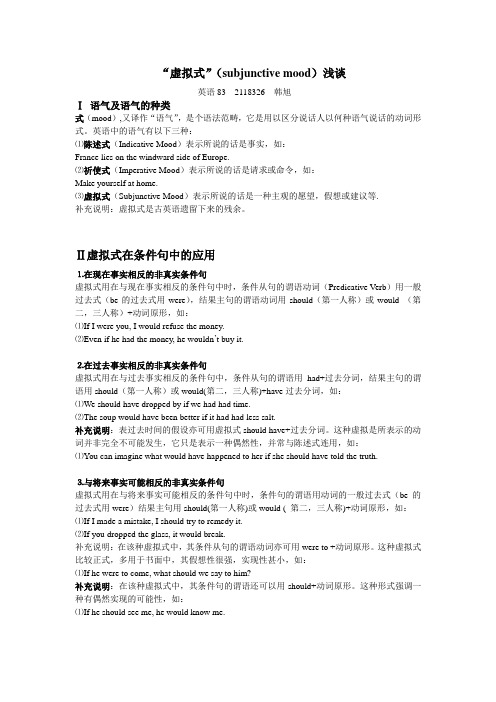
“虚拟式”(subjunctive mood)浅谈英语83 2118326 韩旭Ⅰ语气及语气的种类式(mood),又译作“语气”,是个语法范畴,它是用以区分说话人以何种语气说话的动词形式。
英语中的语气有以下三种:⑴陈述式(Indicative Mood)表示所说的话是事实,如:France lies on the windward side of Europe.⑵祈使式(Imperative Mood)表示所说的话是请求或命令,如:Make yourself at home.⑶虚拟式(Subjunctive Mood)表示所说的话是一种主观的愿望,假想或建议等.补充说明:虚拟式是古英语遗留下来的残余。
Ⅱ虚拟式在条件句中的应用⒈在现在事实相反的非真实条件句虚拟式用在与现在事实相反的条件句中时,条件从句的谓语动词(Predicative Verb)用一般过去式(be的过去式用were),结果主句的谓语动词用should(第一人称)或would (第二,三人称)+动词原形,如:⑴If I were you, I would refuse the money.⑵Even if he had the money, he wouldn’t buy it.⒉在过去事实相反的非真实条件句虚拟式用在与过去事实相反的条件句中,条件从句的谓语用had+过去分词,结果主句的谓语用should(第一人称)或would(第二,三人称)+have过去分词,如:⑴We should have dropped by if we had had time.⑵The soup would have been better if it had had less salt.补充说明:表过去时间的假设亦可用虚拟式should have+过去分词。
这种虚拟是所表示的动词并非完全不可能发生,它只是表示一种偶然性,并常与陈述式连用,如:⑴You can imagine what would have happened to her if she should have told the truth.⒊与将来事实可能相反的非真实条件句虚拟式用在与将来事实可能相反的条件句中时,条件句的谓语用动词的一般过去式(be的过去式用were)结果主句用should(第一人称)或would ( 第二,三人称)+动词原形,如:⑴If I made a mistake, I should try to remedy it.⑵If you dropped the glass, it would break.补充说明:在该种虚拟式中,其条件从句的谓语动词亦可用were to +动词原形。
![Subjunctive Mood[虚拟语气]](https://img.taocdn.com/s1/m/5c5a066748d7c1c708a1453a.png)
Subjunctive Mood(Ⅰ)虚拟语气: 英语的动词一般带有三种不同的语气:陈述语气、祈使语气和虚拟语气。
一、陈述语气(The Indicative Mood):用来陈述一个事实或提出一种看法,有肯定、否定、疑问、感叹等形式。
eg. I like English.二、祈使语气(The Imperative Mood):用来表示请求、邀请、命令、警告或劝告等。
eg. Open the door, please. Don’t play in the street.三、虚拟语气(The Subjunctive Mood):表示说话人所说的话不是事实,而是一种假设、愿望、怀疑或推测。
它通过谓语动词的特殊形式来表示。
虚拟语气主要用于if条件状语从句,也可用于主语从句、表语从句、宾语从句等。
虚拟语气在if条件状语从句中的用法含义动词形式例句If从句主句与事实相反现在一般过去时Would/should/could/might+动词原形If we had enough money,wewould buy a computey.将来一般过去时If it rained tomorrow, we’dstay at home.If I were to ask, wouldyou help me?If it should be necessary,I could come at six.were to+动词原形should+动词原形过去had +过去分词Would/should/could/might have+过去分词If I had worked harder atschool, I would have got abetter job.1、表示与现在事实相反的假设,从句谓语动词用一般过去时(be用were),主句谓语动词用would, should, could, might+动词原形eg. ①If I were you, I would go to see the film.②What would you do if you were in my position?2、表示与将来事实相反的假设,从句谓语动词用一般过去时(be用were)、were to do或should do,主句谓语动词用would, should, could, might+动词原形eg. ①If it were to rain tomorrow, they would not go out.②If the bad weather were to continue, we would have to call off the match.3、表示与过去事实相反的假设,从句谓语动词用过去完成时,主句谓语动词用would, should, could, might+现在完成时eg. ①If you had left a bit earlier, you could have caught the train.②If you had taken the doctor’s advice, you would have recovered.虚拟语气用在wish后的宾语从句中含义动词形式例句针对现状表达愿望(与事实相反)一般过去时I wish I had a little lab ofmy own.对过去发生事情的表示遗憾或后悔过去完成时I wish you had let meknown earlier.针对将来表达愿望(虽然可能性极小,但有实现的可能)Would/ could/ might+动词原形I wish you wouldn’t smokeany more.I wish he could come tomorrow.1、表示现在不能实现的愿望,从句谓语动词用一般过去式(be用were)eg. ①I wish it were spring all the year round.②He wishes he could paint as well as a professional artist.2、表示对过去事情的遗憾,从句谓语动词用过去完成时或could+现在完成时eg. I wish I had been with you yesterday.3、表示对将来的愿望时,从句谓语动词用would/could/ might +动词原形eg. We wish the rain would stop.※1、虚拟的条件有时可以不用条件从句表示,而是通过某些介词短语、副词或上下文等来表达,这就是含蓄条件句。